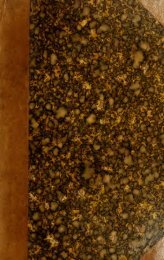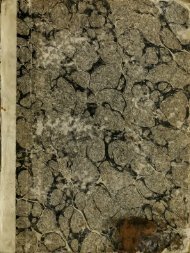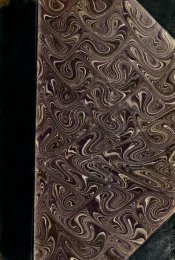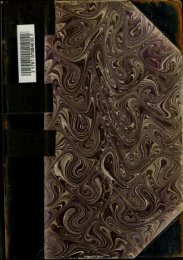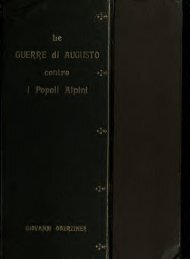Figurative uses of animal names in Latin and their ... - mura di tutti
Figurative uses of animal names in Latin and their ... - mura di tutti
Figurative uses of animal names in Latin and their ... - mura di tutti
You also want an ePaper? Increase the reach of your titles
YUMPU automatically turns print PDFs into web optimized ePapers that Google loves.
Catus. Mach<strong>in</strong>am qu<strong>and</strong>am parvam, quae l<strong>in</strong>gua vul-<br />
gari Catus <strong>di</strong>citur.®^<br />
The accumulation <strong>of</strong> these various quasi-apologetic ex-<br />
pressions shows how rigorous was the opposition to trans-<br />
ferred <strong>animal</strong> <strong>names</strong> on the part <strong>of</strong> the purists. While the<br />
preju<strong>di</strong>ce aga<strong>in</strong>st <strong>their</strong> use was never entirely era<strong>di</strong>cated,<br />
the convenience <strong>of</strong> the terms <strong>and</strong> <strong>their</strong> picturesqueness<br />
enabled them to escape total ostracism.<br />
In the follow<strong>in</strong>g pages an effort will be made to trace<br />
the reasons for the transfer <strong>of</strong> <strong>animal</strong> <strong>names</strong> to military<br />
mach<strong>in</strong>es <strong>and</strong> devices, both <strong>of</strong>fensive <strong>and</strong> defensive.*"*<br />
These <strong>animal</strong> terms appealed so strongly^^ to the Romans,<br />
especially the later technical writers, that they deemed it<br />
worth while to stop to expla<strong>in</strong> the transfer, <strong>in</strong> some <strong>in</strong>-<br />
stances even hazard<strong>in</strong>g a guess as to the reason for it.<br />
Such a penchant <strong>di</strong>d the Roman have for etymologiz<strong>in</strong>g,<br />
that at times we f<strong>in</strong>d three or four reasons adduced, a few<br />
<strong>of</strong> them not without a gra<strong>in</strong> <strong>of</strong> humor. Our present task<br />
will be to sift <strong>their</strong> testimony, <strong>in</strong> an endeavor to <strong>di</strong>scover<br />
the <strong>di</strong>st<strong>in</strong>guish<strong>in</strong>g shape, trait, habit, or characteristic that<br />
caused the transfer. The change from the literal to the<br />
figurative is seldom due to a resemblance <strong>in</strong> more than one<br />
particular.<br />
Apropos <strong>of</strong> this Breal says: II n'est pas douteux que le<br />
langage designe les choses d'une fagon <strong>in</strong>complete et <strong>in</strong>exacte.—Mais<br />
si je prends un etre reel, un objet existant dans<br />
la nature, il sera impossible au langage de faire entrer dans<br />
le mot toutes les notions que cet etre ou cet objet eveille<br />
dans I'esprit. Force est au langage de choisir. Entre<br />
toutes les notions, le langage en choisit une seule: il cree<br />
a<strong>in</strong>si un nom qui ne tarde pas a devenir un signe.'*<br />
Consequently, <strong>in</strong> order to effect a transfer from one<br />
" Quoted by Du Cange, s. vv.<br />
" Cf. <strong>in</strong> Eng. basilisk, cat, crows' feet, culver<strong>in</strong>, dogs <strong>of</strong> war, ram,<br />
torpedo, etc.<br />
The appeal <strong>of</strong> such figures is shown by the grim 'joke <strong>of</strong> Black Agnes<br />
<strong>of</strong> Dunbar, when she had smashed the penthouse <strong>and</strong> saw its occupants<br />
scamper<strong>in</strong>g away from beneath : " Behold, the English sow has farrowed."<br />
Oman, A History <strong>of</strong> the Art <strong>of</strong> War, p. 133.<br />
"Essai de SSmantique, pp. 191, 192.<br />
'


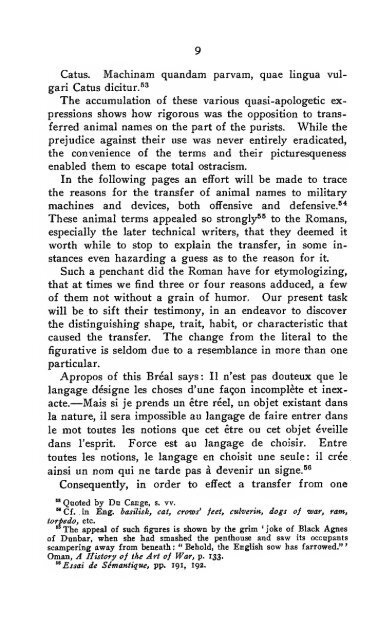
![Das Kriegswesen der Alten [microform] - mura di tutti](https://img.yumpu.com/21606999/1/167x260/das-kriegswesen-der-alten-microform-mura-di-tutti.jpg?quality=85)
